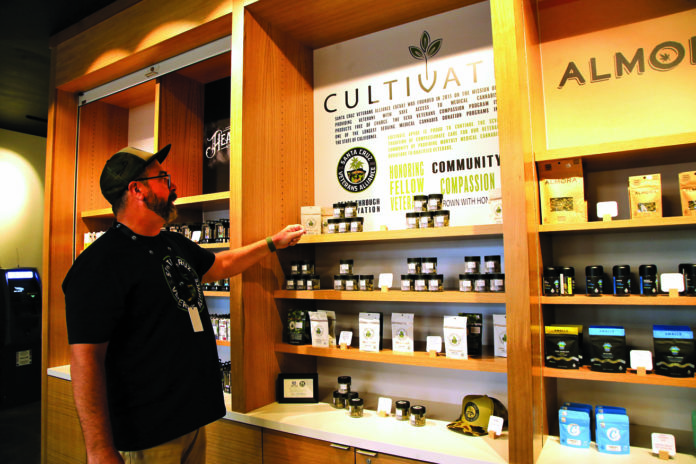
The Santa Cruz County Board of Supervisors on Tuesday approved a plan to allow customers in marijuana dispensaries to smoke onsite in so-called cannabis lounges.
They also green-lighted a three-year pilot program to allow limited sales and consumption at marijuana farms.
Both proposals brought no-votes from Supervisors Bruce McPherson and Zach Friend.
Allowing customers to smoke or otherwise consume marijuana in dispensaries and at farms is seen as a way to help local cannabis businesses and boost tax revenue.
It also gives out-of-town visitors a place to use the products, said Santa Cruz County Cannabis Licensing Manager Sam Laforti.
“Consumption is a missing piece of our legal market,” he said. “Currently the only place someone can legally consume cannabis is a private residence.”
Supporters of the proposed ordinances—which will come for a second read and approval at the next board meeting—also say that they will pave the way for cannabis tours to come to the county.
These would visit farms, where tourists could purchase up to an eighth-ounce of prepared marijuana, and check out dispensaries.
They would also bring money to local hotels and restaurants, said Victor Pinho, whose company Emerald Farm Tours offers several summertime excursions statewide.
While his customers pay roughly $1,000 for a tour, most of that money stays local, since he pays the farmers and offers meals.
“These cost money, but we leave most of that behind,” Pinho said. “We see this as a lifeline for farmers and retailers who are really under a lot of pressure to perform and succeed and stay afloat.”
According to Laforti, 20% of American leisure travelers are interested in cannabis-related activities, a number that rises to 62% for those with higher income.
The California cannabis market was valued at $17.1 billion in 2021, LaForti said.
Under the proposed ordinance, dispensaries wishing to add a consumption lounge would apply for an amendment to their existing license.
They would then be required to comply with smoke-free workplace requirements, and workers would not be required to go into the consumption areas.
The odors from smoking lounges, the ordinance states, must not be detectable outside.
Several people addressed the board, all of them largely in favor of the ordinances.
“One thing I think is really beneficial about having consumption lounges is that it does provide an opportunity for the community to be able to consume cannabis together, to learn together, to have that experience together,” said Colin Disheroon, founder and CEO of Santa Cruz Naturals.
“The concept that we can have recreational cannabis be legal and for sale all throughout the county, but yet no places are legal for a non-resident to be able to consume cannabis is nuts.”
Local cannabis grower Jeff Nordahl said that the cannabis industry transcends traditional retail shopping.
“Cannabis really is an experience, and people consume cannabis to have an experience,” he said.
The same is true, he added, with tourism in Santa Cruz County.
“The two perfectly compliment each other,” he said.
Supervisor Manu Koenig said he likes the educational possibilities that the ordinances present.
“Creating a social cannabis culture is really going to set us apart,” he said. “What we can do is provide a better way to experience this plant, a richer way to do that and pass on and create shared knowledge.”
Supervisor Bruce McPherson said he was worried about the potential risk to public safety posed by people smoking marijuana in dispensaries and then driving.
He also expressed doubt that the changes would appreciably increase tax revenue or bolster tourism.
Friend said that he was worried about the impact allowing sales at farms would have on existing brick-and-mortar businesses.
“I’m not 100% sure what problem we’re trying to solve here,” Friend said. “We’ve got an entire industry that’s struggling, but this would advantage one section of the industry and disadvantage one section of the industry,” he said.












So stupid. Allowing people to get stoned and then drive home. How many accidents will happen with those driving under the influence doe to Santa Cruz Supv stupidity? Are they getting kickbacks??
Stop it Karen